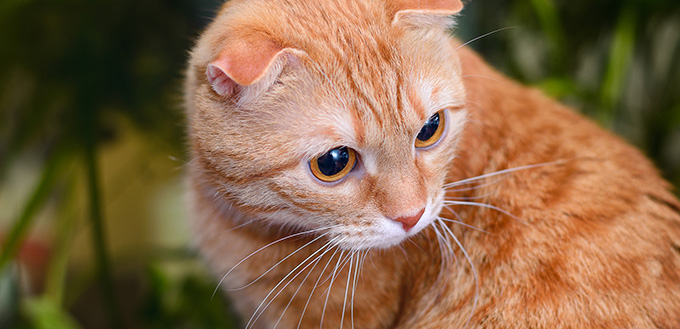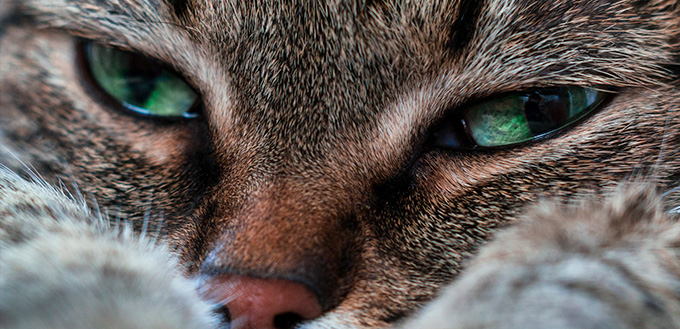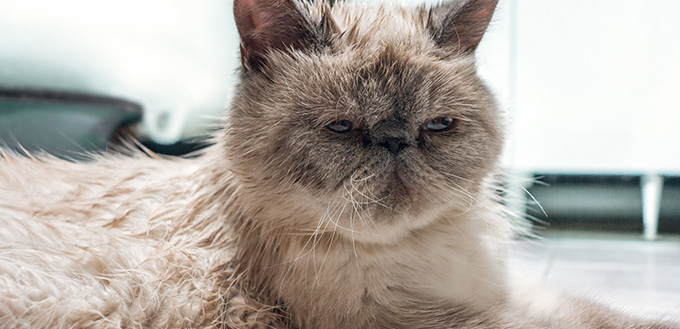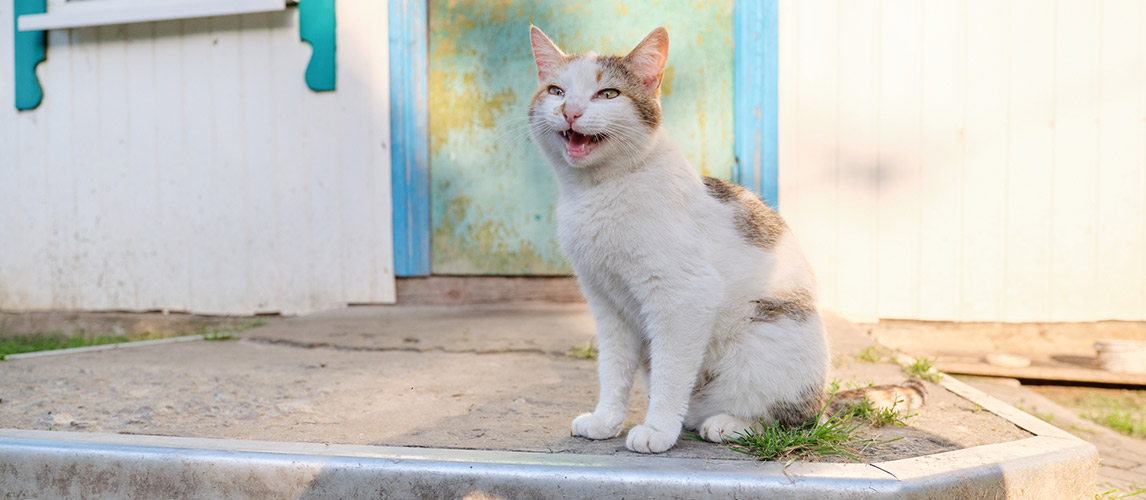Crying is a universally understood sign of distress or unhappiness. For human beings, there are many different types of crying. You might be sobbing out of sadness, tearing up from pain or crying out in frustration, but is this also true for your cats? It is easy to assume you can interpret your cat’s behavior using your understanding of human behavior, but this isn’t always a good idea because your cat’s emotions may exhibit in very different ways. Is it even possible for cats to cry when they are sad?

Can Your Cat Cry Tears?
To understand if cats cry, it is first important to understand what we mean by crying. If you are wondering if they have tear ducts and the capability to have watery eyes, then the answer is yes – your cat can cry. However, if you are wondering if they will shed tears as a result of emotional problems, the answer is no. Thus far, research has not been able to find any animals, other than humans, who shed tears as a sign of sadness, anxiety or distress.
Many cat parents will swear that their cats have cried when they are sad, but this anecdotal evidence has generally been proven to be false. There are reasons that a cat may tear up, but they do not cry when they are sad. If your cat tears up during a difficult time, such as a bereavement, it is most likely a coincidence.
This does not mean that cats are not the emotionally intelligent animals we all know and love. Plenty of other studies have proven that cats experience emotions, including sadness, and can understand human emotions. They just don’t express those emotions with tears. Typical examples of how your cat may display their emotion include:
- Behavioral changes, such as loss of appetite or self-imposed isolation
- Vocalizations, such as purring, yelping or snarling
- Aggressive behavior
Why Might Your Cat Shed a Tear?
Just because your cat does not cry when they are sad, does not mean they will never have watery eyes. Their eyes may even become so watery that it pours down their face, just as tears would. If this does not occur for emotional reasons, why does it occur at all?
Well, first of all, it is important to understand the purpose of tear ducts. In all animals with tear glands, which are also known as lacrimal glands, the tear fluid that is produced is necessary for stopping your eye from drying out and for keeping your eye clean. The fluid is spread across your eye whenever you blink, and this protective layer catches dust and other small pieces of dirt that would otherwise irritate your eye.
This extremely common biological function should not normally result in tears streaming down your cat’s face. If you do notice tears, there is often a biological or medical explanation. Most notably, if you are the owner of a flat-faced breed, which is known as Brachycephaly, it is quite common for tears to stream down their face if their cheekbones do not protrude enough to allow their ducts to drain the tear fluid effectively. This can be fairly harmless, though may discolor the fur under their eyes so you may want to regularly wipe their face for them.
There are other, more potentially dangerous, reasons your cat appears to be crying. Their eyes are likely to be overproducing tear fluid in an attempt to deal with a retinal issue, such as irritation or something worse. Common medical concerns that may explain your cat’s teary eyes include:
- Dirt, dust or a scratch on their eye
- Upper respiratory infection
- Clogged tear ducts
- Infections
- Cat allergies
- Conjunctivitis, which is also known as pink eye
It is very important that you seek medical help if your cat is tearing up unexpectedly or regularly. Infections, wounds, and many other issues that affect the eye can cause permanent loss of vision, so it is important to catch and treat it early in order to save your cat’s eyesight. Never assume tears are an expression of emotion that can be solved by a hug and a kiss, it is almost definitely an important medical issue.

Do Cats Never Cry?
As we’ve already discussed, the short answer about your cat’s crying is that they do not shed tears when they are sad, but may shed tears if there is a physical issue. However, that doesn’t mean that they don’t have their own form of crying. Cats are known to vocalize their sadness, and these sounds are often compared to crying as they can be very similar.
Many pet parents describe their cat as ‘crying’ when they cry out or whine as an expression of sadness. These vocalizations can be heartbreaking and, for some cats, may be instantly recognizable as sounds of sadness. For many pet parents, whimpering, whining, crying out, can all be considered forms of ‘crying’ that require plenty of cuddles, love and attention.
Reasons for a Cat to Cry
This natural emotive response to sadness that we are calling ‘crying’ can be quite common among cats that are experiencing difficult circumstances. It is quite likely that it accompanies other symptoms of sadness or anxiety that you may want to watch out for. Examples of other sad behavior could include:
- Becoming clingy and seeking additional comfort from you
- Becoming more withdrawn from the family, perhaps hiding more frequently
- Becoming lethargic and unmotivated, perhaps to the point where they lose their appetite
If you suspect that your cat is crying and feeling very sad, it can help to figure out why. Sometimes it may be an obvious change in their life and environment, but it can also be something smaller that is a little harder to spot. Common causes for a cat to become sad and cry out may include:
- Grief, which can happen if your household loses a family member, including other pets
- Moving home
- Adapting to a new family member, such as a new partner, child, or pet
- Hunger
- Boredom or loneliness
- Other stressors
It takes some time to get to know your cat and what their vocalizations can mean. Some cats are very quiet so their parents know to pay attention when they start crying out, while other cats are always very noisy and their parents slowly learn what each and every noise could mean. As you first get to know your cat, there may be several noises you don’t understand and, while most of they are probably fine, you may want to seek advice to ensure there is nothing wrong.
The most vital thing is that you get medical help if you are unsure and worried about what any vocalization or behavior could mean. While your cat may be crying out or whining because they are sad, it could also be a symptom of pain or any number of health issues. If you have any doubts about the cause of their vocalization, even if there is also a recent emotional event that could similarly explain it, it is always best to visit your veterinarian.
Crying Kittens
Kittens can seem particularly sweet and vulnerable if you hear them crying out, but, as with adult cats, if you see actual tears it is likely to be a health concern that you should bring up with your vet. As they are more vulnerable, have more new experiences to explore and are generally more vocal, kittens can be more likely to cry out from fear, stress, anxiety or sadness. There are many potential causes of this sadness, such as:
- Loneliness
- Confusion, or getting lost in a new environment
- Hunger
- Pain
- Illness

Helping Your Crying Cat
Obviously, as we have already advised, a cat that is regularly tearing up should visit the vet, and you should also take a vet if you are worried about any unusual vocalizations, such as whining or crying noises. However, if you are wondering ‘What can I do to help my crying cat?’, there are a few tips you can try to help them to feel less sad or anxious:
- Do not reprimand or punish them for being loud. Although, at first glance, it can seem like a bad behavior, it is better to resolve the source of their sadness because you may be causing further anxieties and sadness if you punish them.
- Adapt your home so that it appears safer and more comforting for your cat. This could mean you create more hiding spots and window perches for them, or you may need to think about where you have positioned their cat bed, litter tray or food. Is it accessible? Is it in a busy, noisy area?
- Make sure you are spending enough quality time with your cat. This time should both be frequent and should require your full attention. Five minutes of absentminded petting, while you watch TV, is not going to make them feel like they have your love and attention.
Check out our guide on the Best Calming and Anti-Anxiety Products for Cats.
Sources:
- Jean Duddy, DVM, Why is My Cat Crying?, The MSPCA–Angell
- Naomi Millburn, What Does It Mean When Male Cats Cry?, The Nest







